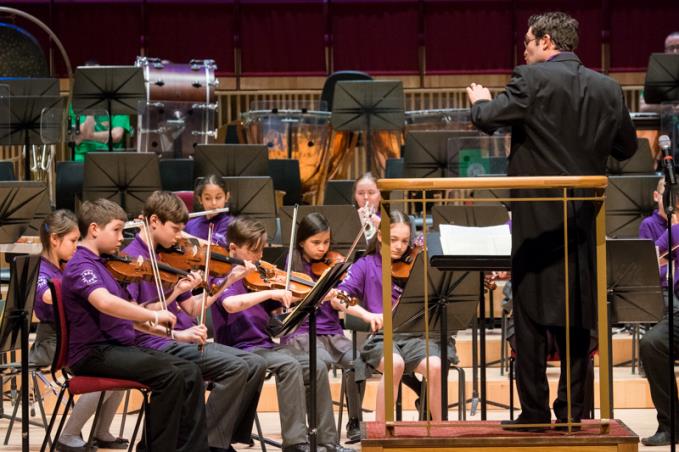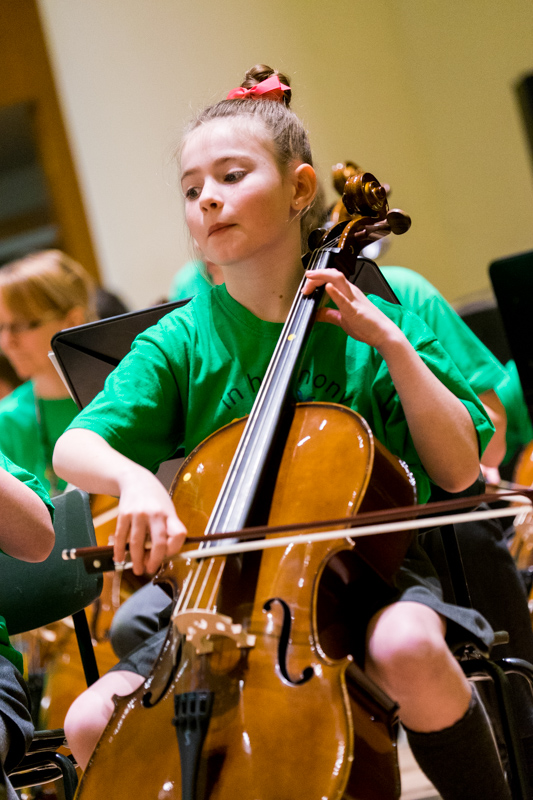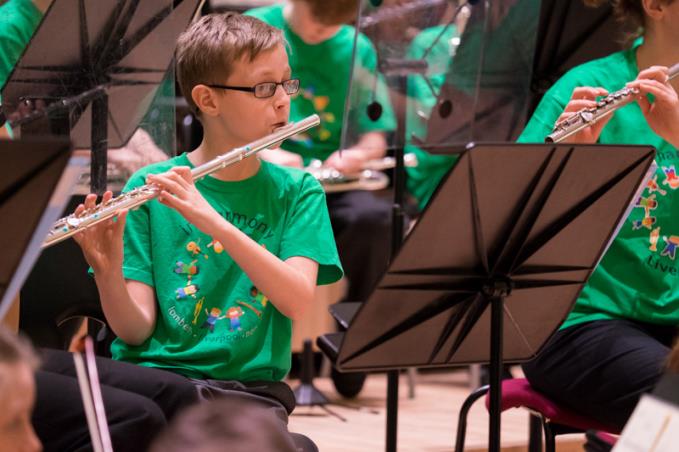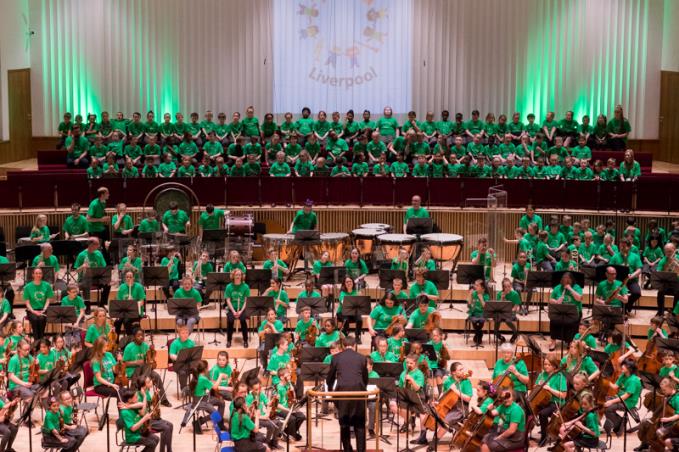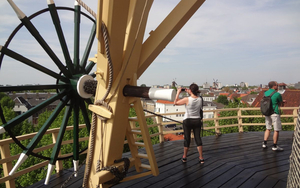Pictures by Mark McNulty
THEY are getting rather used to it now. Brass sections turning up in the front parlour. Packing the prized cello in a flight case for a recital at the Southbank. Not forgetting easy attainment in maths tests that would have baffled most of them just a few short years ago.
In the event, they did forget the maths tests - for one day anyway.
We are talking about the hundreds of Everton primary school children who downed pencils and abandoned the classroom yesterday to blow out the notional candles on a special seventh birthday party.
As usual, there was plenty to sing, strum and shout about: the annual In Harmony concert at the Philharmonic Hall celebrating the 2009 inception of the groundbreaking children’s orchestra.
Once again, they were joined by musicians from the RLPO for this packed out gathering of proud families, friends and classmates.
Privilege or money won't get you into this cultural coterie, which is perhaps what makes it all the more joyous.
Even the most cynical stuffed shirt in the room (and there were plenty of those too) could not fail to be moved by the occasion: 90 minutes of orchestral pieces that would challenge the most seasoned pro, ranging from Bernstein to Beethoven to Mark Ronson's Uptown Funk and golden confetti cascading down on all for the finale of Hey Jude.
Classical music is no longer a world that we’re excluded from…it’s now our world, we love being in it
For 2016, however, there was extra icing on the cake: the release of two academic reports confirming what we already suspected or knew: that the power of music has the ability to transform lives.
Furthermore, the magic is unfolding in L5, one of the most socially and economically deprived postcodes in Europe.
“There is nothing quite as striking as walking through a sink estate in north Liverpool and encountering a boy or girl on a doorstep playing a violin,” one hardened Phil executive told Confidential a couple of years ago.
First up on the document front is the annual evaluation report by consultant Dr Susanne Burns. The second, Playing at Home, by the University of Liverpool’s Professor Jude Robinson, reveals the positive impacts of In Harmony Liverpool on children, their families and the wider community. The Burns and Robinson findings show:
* In Harmony Liverpool has played a prominent role in children’s educational achievement, both through musical skills development and performance, and in other academic subjects such as maths and English.
* In Harmony Liverpool has led to improvements in children's wellbeing, particularly aspiration and resilience, as well as their sense of belonging and pride in their community.
* In Harmony Liverpool has had a positive impact on families and family life in Everton, particularly through parents’ engagement with their children's learning and relationship with their school and community.
Nowhere is this evidence more tangible than at Faith Primary School where In Harmony was incubated by the Liverpool Philharmonic Orchestra in 2009. Inspired by Venezuela’s world famous El Sistema children’s orchestra, the idea was to use orchestral music-making to improve the health, education and aspirations of children and young people in Everton.
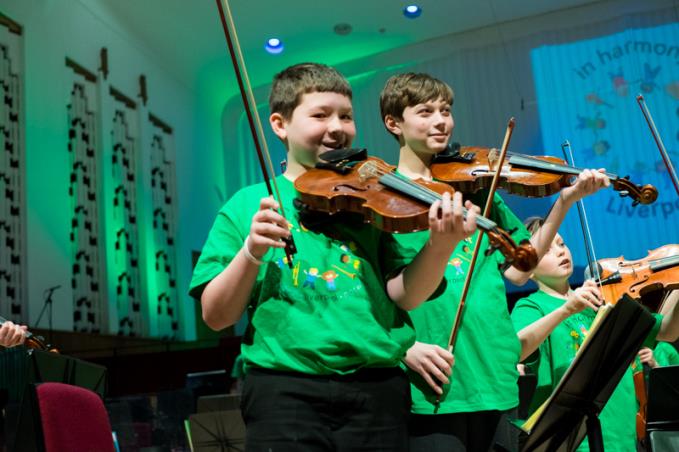
When project leaders at the Liverpool Philharmonic began handing out expensive violas and clarinets to seven year olds that year, just 28 percent of Faith’s school population were reaching national expectations in maths.
In 2014/15 that figure had reached 82 percent. In the two other Rs, the numbers have been similarly impressive: writing, 28 percent to 54 percent. Reading, 34 percent to 74 percent.
Last year Everton Nursery School and Family Centre and The Beacon CE Primary School joined the programme, increasing In Harmony Liverpool’s reach from working with 84 children in 2009 to 720 children aged 0-17 and their families in 2016, all taking part in orchestral music-making of the highest quality every week, free of charge, in and out of school.
The musical tentacles reach far beyond the playground - where RLPO string and brass sections have been known to turn up for impromptu lunchtime concerts.
Play At Home sees the whole family involved. “Last Christmas a string quartet from the Philharmonic came to our house and played carols in the front room,” recalled a mum of two boys, both veterans of the Class of 2009, one woodwind, one string.
“All the nans and granddads came to see what was going on, all the aunties and uncles. None of them had ever set foot in the Phil or had ever been to anything like it. If I’m honest, it left a massive impression on all of us.
“They have played at the Royal Albert Hall and The Southbank Centre and the eldest , who is in the Everton Youth Philharmonic, wants to go on and play professionally.”
Another parent, quoted in the Burns report, says: "The Phil is really big… I like showing off at work about it. It’s like Liverpool FC coming in to teach football.”
In Venezuela, the El Sistema programme is widely credited for rescuing young people in extremely impoverished circumstances from the environment of drug abuse and crime into which they would likely otherwise be drawn.
It has affected the lives of 700,000 children since 1975 when it began with 11 students in an underground parking garage under the leadership of José Abreu.
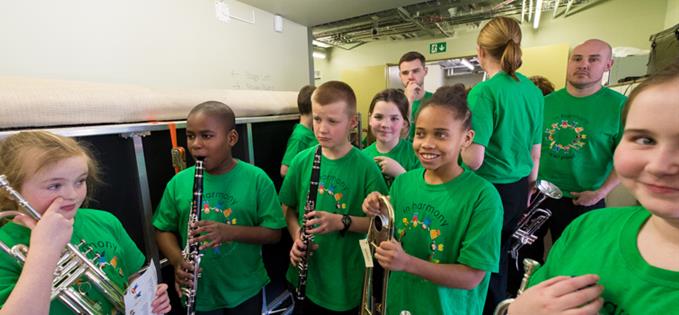
Star graduates include Gustavo Dudamel, musical director of the Los Angeles Philharmonic, who says: ”Music saved my life and has saved the lives of thousands of at risk children in Venezuela...like food, like health care, like education, music has to be a right for every citizen."
Another, Alcides Rodriguez, clarinetist with the Atlanta Symphony Orchestra has said "El Sistema was an open door to another dimension, a different world that I probably could have never seen.”
It hardly seems like yesterday since the Venezuelan ensemble smashed the show at the BBC Proms with their sophisticated and inspired take on Bernstein’s West Side Story.
Actually, it was 2007 and we were wowed by the back story. Why couldn’t we in Britain do something like that? many wondered.
Well, we could. Liverpool and Lambeth quickly blazed the British trail in pilot schemes established by the Labour government and funded by Arts Council England and the Department for Education. Other In Harmony programmes have since been established in Leeds, Newcastle Gateshead, Nottingham, Telford and Stoke-on-Trent.
Liverpool City Council Cabinet Member and Councillor for Everton, Jane Corbett, says: “For our children to be taught by musicians from the Philharmonic, for them to become our friends, and for the Philharmonic to become like a second home to our community, is something very special.
"We’re all learning from each other, the educational attainment and health of the children is increasing dramatically, and classical music is no longer a world that we’re excluded from…it’s now our world, we love being in it, and we love having the opportunity to share it with others."
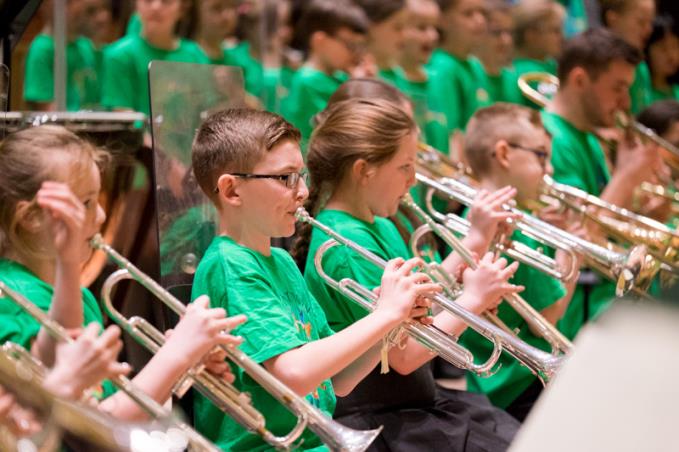
Peter Garden, Liverpool Philharmonic’s Executive Director of Performance and Learning, commented: "These two reports show In Harmony Liverpool is proving to be an exemplar of how an organisation with international status can and should have real and positive impacts in its own city and community.
"The long term commitment to In Harmony Liverpool by all involved has been crucial to its success and impact with hundreds of children and families."
Garden added: "We remain incredibly grateful to the children, families, school staff, partners and Everton community for their support, commitment and enthusiasm for In Harmony."
Undoubtedly, it cuts both ways.
*Dr Susanne Burns: In Harmony Liverpool 6 Year Evaluation Report. Professor Jude Robinson: Playing at Home: How Families Engage with In Harmony Liverpool. Both reports in full, here.
